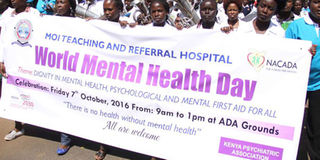Don’t let stress and trauma take down our soldiers

Moi Teaching and Referral Hospital workers and members of the public mark the World Mental Health Day on October 7, 2016 in Eldoret town. Leaders must establish facilities that address mental health issues. PHOTO | JARED NYATAYA | NATION MEDIA GROUP
What you need to know:
- Post-traumatic stress disorder is one among a group of disorders that may afflict a person exposed to traumatic events.
- It is absolutely important to begin taking the health of our soldiers seriously.
Eleven years ago we conducted a study among the old men and women who had survived the colonial Mau Mau concentration camps before we attained independence.
In that study, we assessed the veterans for a condition known as posttraumatic stress disorder (PTSD), and found about two-thirds of them still had serious symptoms of the condition 50 years after their incarceration.
Three out of four had had significant symptoms in their lifetime, and many of them suffered serious social and occupational dysfunction as a result.
TRAUMATIC EVENTS
Post-traumatic stress disorder is one among a group of disorders that may afflict a person exposed to traumatic events involving a serious threat to their own life or wellbeing, or that of persons close to them.
Such events include physical and sexual violence, war events, natural and man-made disasters, and even witnessing traumatic events happening to others.
People who develop PTSD will have difficulties focusing on their day-to-day needs and are distracted by unwanted and disturbing memories, mood changes, emotional numbing, irritability and being on edge most of the time.
POLICY MAKERS
In the study we carried out among the Mau Mau veterans, we recommended that a veterans’ service be established to address their health and social needs as well as those of serving officers in the police and military.
Unfortunately, that recommendation continues to gather dust in the archives of academic literature despite being brought to the attention of policy makers at the time.
I was reminded of this work recently when I met a serving military man.
He looked disturbed, and we managed to have a very brief conversation with him.
EX-KDF SOLDIER
He was initially loud, telling everyone who would listen that he was in the military and had served with distinction in several theatres, including in the Somalia operation.
I learnt he had lost very many colleagues in war, including in an incident where dozens of his comrades died in an ambush.
The anguish he felt was clear for all to see and hear, and when I spoke to him I realised that his was a genuine cry for help.
He was very well informed about the suffering among military personnel that we send to the frontlines to protect our country, and when he realised his was my line of work he asked me to speak about the need to improve mental health services for them.
CRUEL DISORDER
Specifically, he asked me to look into establishing treatment facilities for the psychological trauma many of our soldiers suffered from after being exposed to the vagaries of war.
“Please speak out for us,” he pleaded. “Otherwise we shall be destroyed from the inside.”
A recent television documentary demonstrated the depth of the problem, indicating that even the widows of those slain in war suffer extreme psychological distress that is only exacerbated by family and other social disputes over the handling of the estates of the deceased.
PTSD is a cruel disorder that traps the sufferer within the traumatic environment, refusing to let one move on with their life.
VETERANS' HEALTH
One is constantly reminded of the trauma, and even innocuous cues in the environment trigger memories and reactions that relive the event.
It is absolutely important to begin taking the health of our soldiers seriously.
While the military health services department is doing the best they can, it is my view that we need a massive investment in the health of our soldiers and veterans who have served this country in the disciplined forces.
MANIFESTO
As the world becomes more and more dangerous around us, the need for more young people to take up arms to protect us seems to be increasing.
We cannot afford to place any but the healthiest and fittest of us into armed service, and setting up a robust health system for them appears to be the best way of assuring this.
On behalf of the soldier I met and had a brief conversation with, who appeared to be suffering from PTSD himself, I beg all the contenders for the highest office in the land to include a veterans’ service in their health manifestos going forward.
Atwoli is Associate Professor and Dean, Moi University School of Medicine [email protected]





